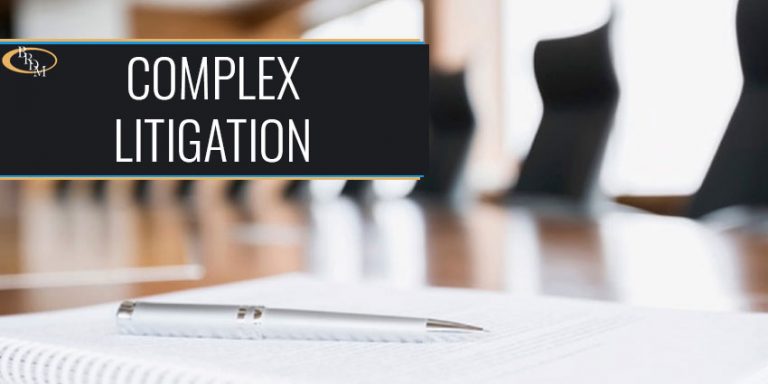Pursuant to Florida law, a “complex action” is defined as an action which is likely to involve complicated legal or case management issues and that may require extensive judicial management to expedite the action, keep costs reasonable, or promote judicial efficiency.
Florida Rule of Civil Procedure 1.201 sets forth definitions and procedure for cases which are identified as complex. In determining whether an action is complex, courts will consider the following factors:
- Whether the action is likely to involve numerous pretrial motions raising difficult or novel legal issues or legal issues that are inextricably intertwined that will be time-consuming to resolve;
- Whether the action is likely to involve management of a large number of separately represented parties;
- Whether the action is likely to involve coordination with related actions pending in one or more courts in other counties, states, or countries, or in a federal court;
- Whether the action is likely to involve pretrial management of a large number of witnesses or a substantial amount of documentary evidence;
- Whether the action is likely to involve substantial time required to complete the trial;
- Whether the action is likely to involve management at trial of a large number of experts, witnesses, attorneys, or exhibits;
- Whether the action is likely to involve substantial post-judgment judicial supervision; and
- Whether the action is likely to involve any other analytical factors identified by the court or a party that tend to complicate comparable actions and which are likely to arise in the context of the instant action.
- a brief factual statement of the action, which includes the claims and defenses;
- a brief statement on the theory of damages by any party seeking affirmative relief;
- the likelihood of settlement;
- the likelihood of appearance in the action of additional parties and identification of any nonparties to whom any of the parties will seek to allocate fault;
- the proposed limits on the time: (i) to join other parties and to amend the pleadings, (ii) to file and hear motions, (iii) to identify any nonparties whose identity is known, or otherwise describe as specifically as practicable any nonparties whose identity is not known, (iv) to disclose expert witnesses, and (v) to complete discovery;
- the names of the attorneys responsible for handling the action;
- the necessity for a protective order to facilitate discovery;
- proposals for the formulation and simplification of issues, including the elimination of frivolous claims or defenses, and the number and timing of motions for summary judgment or partial summary judgment;
- the possibility of obtaining admissions of fact and voluntary exchange of documents and electronically stored information, stipulations regarding authenticity of documents, electronically stored information, and the need for advance rulings from the court on admissibility of evidence;
- the possibility of obtaining agreements among the parties regarding the extent to which such electronically stored information should be preserved, the form in which such information should be produced, and whether discovery of such information should be conducted in phases or limited to particular individuals, time periods, or sources;
- suggestions on the advisability and timing of referring matters to a magistrate, master, other neutral, or mediation;
- a preliminary estimate of the time required for trial;
- requested date or dates for conferences before trial, a final pretrial conference, and trial;
- a description of pertinent documents and a list of fact witnesses the parties believe to be relevant;
- number of experts and fields of expertise; and
- any other information that might be helpful to the court in setting further conferences and the trial date.
Final Case Management Conference
The court will also hold a final case management conference. The final conference will occur no later than ninety (90) days prior to the date the case is set for trial. At least ten days prior to the conference, the parties are to meet and prepare a case management report which includes the following:- A list of all pending motions requiring action by the court and the date those motions are set for hearing;
- Any change regarding the estimated trial time;
- The names of the attorneys who will try the case;
- A list of the names and addresses of all non-expert witnesses (including impeachment and rebuttal witnesses) intended to be called at trial;
- A list of all exhibits intended to be offered at trial;
- Certification that copies of witness and exhibit lists will be filed with the clerk of the court at least 48 hours prior to the date and time of the final case management conference;
- A deadline for the filing of amended lists of witnesses and exhibits, which amendments shall be allowed only upon motion and for good cause shown; and
- Any other matters which could impact the timely and effective trial of the action.



